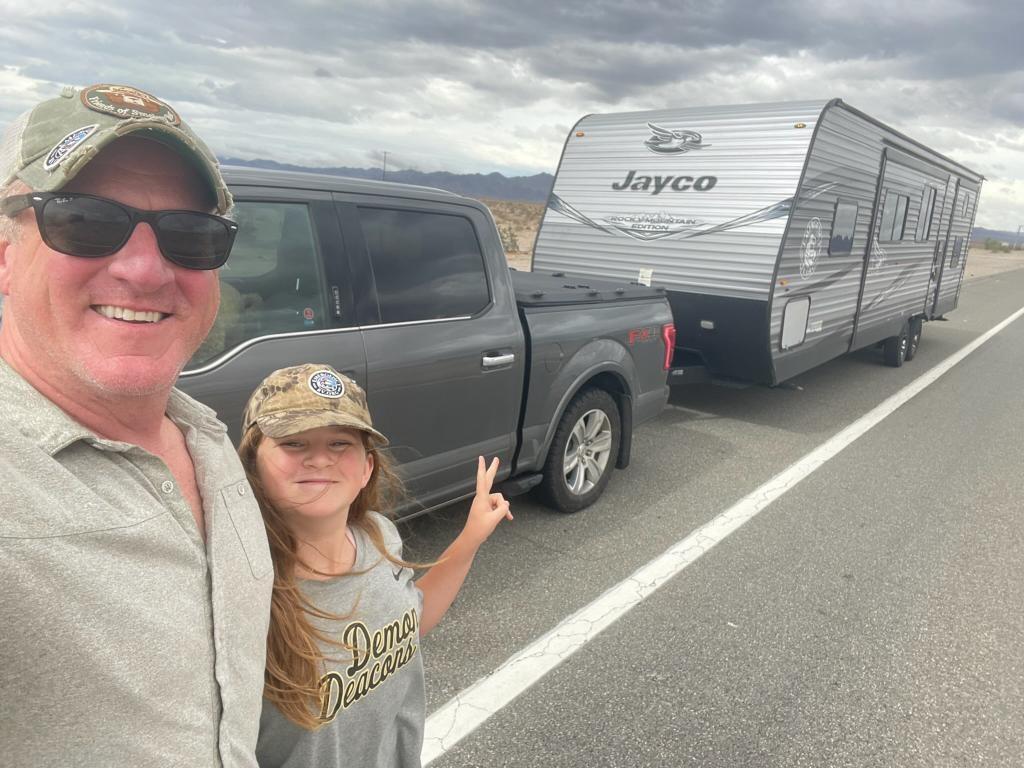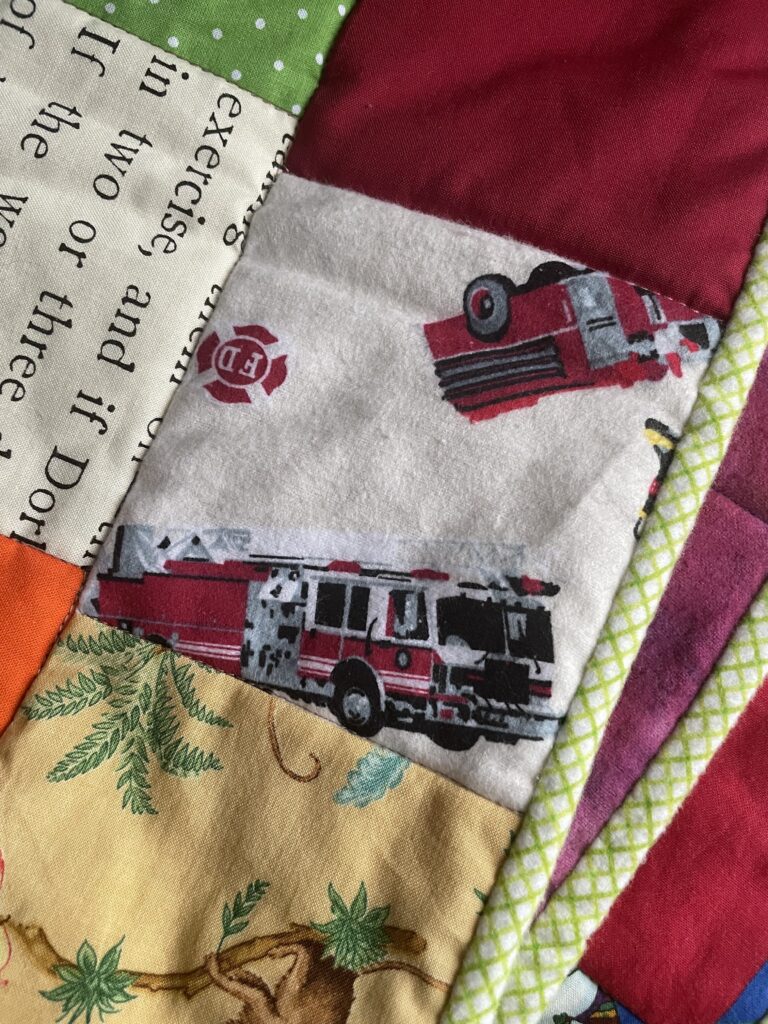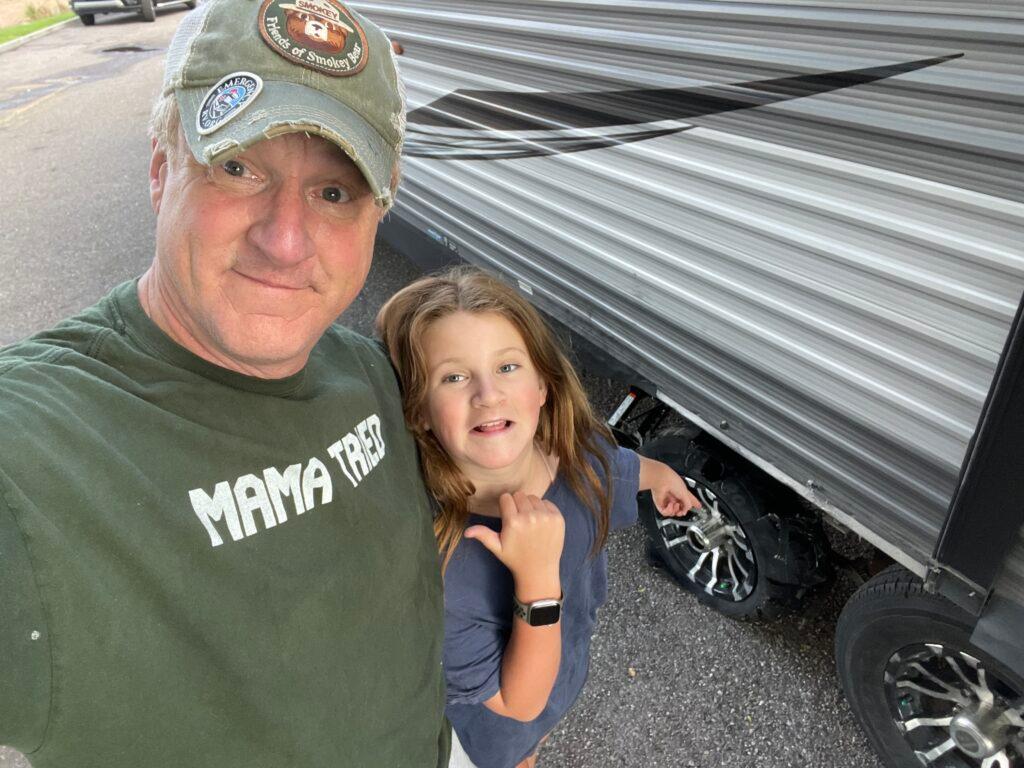
Five firefighters who lost their homes in the blazes that recently devastated Maui are about to get temporary homes, courtesy of a Colorado nonprofit.
Woody Faircloth of Denver founded EmergencyRV.org, a charity that donates RVs to first responders who lose their homes in natural disasters. The group sent five vehicles from San Diego to Maui on a ship that was scheduled to leave Monday evening. Faircloth hopes to send more trailers next week.
Eighteen firefighters are known to have lost their homes in the fires, Faircloth said. Many are still working. The likelihood is their families are scattered around with friends or family on the island.
Faircloth’s work began in 2018 after the Camp Fire ravaged a town in Northern California. He was later recognized as a CNN hero for his efforts.
He spoke to Colorado Matters producer Michelle P. Fulcher on Friday before he and his 11-year-old daughter Luna left Denver to tow one of the trailers to San Diego. They were delayed by three flat tires on Saturday, drove through the storm that hit Sunday and arrived in San Diego around 1 a.m. on Monday.
Read the interview
This interview has been edited for length and clarity.
Who are these RVs destined for?
These RVs are going to some of the 18 firefighter families who lost their own homes while fighting the fires in Hawaii. A lot of these firefighters are still on the job sleeping in their fire trucks and we just think they deserve a nice place to sleep at night and to be able to take a shower and eat a home-cooked meal. We've collected eight (RVs) so far.
I was talking to my daughter about, ‘Hey, I wish we could help these people in Maui, but there's no way to get RVs there. It's really difficult.’ Then we looked into possibly shipping them. Then an organization we've worked with in California, the California Fire Foundation, who have introduced us to firefighters who've lost homes in some of the big fires out there, said, ‘Hey, we will help you get the RVs there on a ship, so you just have to get them to San Diego. We have five that we’re going to put on the ship and they’ll go over and we’re going to do another shipment a week from now to try and help these families.
Where have these RVs come from in such a short period of time?
I think it really boils down to the fact that when disasters like this happen, people want to help. They just often don't know how to help. We kind of stumbled on this perfect transitional emergency housing solution in the form of RVs back in 2018 with the Camp Fire (in Paradise, California) and we've been helping following natural disasters ever since.
We just put the word out and there are RVs everywhere. A lot of them are not used, most of them are not used, they're just kind of sitting there and when the RV owner realizes that we can give them the full appraised value as a tax deduction and it can go to such a great use, it's just a no-brainer and everybody wins. So we just put the word out and actually four of these came from either retired or current firefighters California. They just said, ‘Hey, those are my brothers and sisters that have lost their homes and we want to help them,’ so they're donating these RVs outright. And we actually had one here in Colorado that we've been doing some work on that we're going to hit the road and drive it out to San Diego and get it on the ship as well.

What are the logistics behind this — how do you get five berths on a ship?
I've just learned that miracles kind of happen in this work. I didn't even know we could ship them to Hawaii at the beginning of the week, but we were able to find space and actually the space was donated to us on the ship, so it won't cost us anything to get them there. It's just miracles really. I don't know how else to put it.
What’s the experience been like for these firefighters in Maui?
It's horrifying. Their entire community burned to the ground. More than 2,000 structures were destroyed; 86 percent of those were single-family homes.
It's just awful. These guys don't make a ton of money. A lot of them choose this line of work just out of a service intention on their part. They're real heroes. They're always out there putting themselves on the line for the rest of us. People are fleeing the fire and they're driving into it.
It’s really sad when this happens and as talented and as much equipment as they have, when a fire like that breaks out and the wind's blowing 80 miles an hour, there's nothing you can do. We saw that here in the Marshall Fire. We've seen that in other fires in California that we've worked.
The unfortunate reality is, FEMA and the Red Cross swoop in and they do great work but it'll take FEMA a full year to get housing units there and that's just too long to wait for people that don't have the choice of going and staying with family off the island or elsewhere. These folks are still working every day and not having a place to go home to, especially when they have families, is something that we just don't think should happen. That's why we're so passionate about helping these folks.
Thinking back on your experience over these years, have you talked to firefighters who've been in a similar position, losing their homes and trying to work at the same time?
Absolutely. The really interesting thing about first responders in general is they're the last to ask for help and the very first ones to help. They're just going to keep working and do what they have to do, but giving them a place to lay down at the end of the day and have a warm meal and take a shower is just invaluable, we think.
Speaking of logistics, it doesn't seem like the most efficient way to get housing to folks — to have to put an RV on a boat, get it over there, get it set up. Why this approach?
The first thing we do anytime a disaster like this strikes is we look to see if we could source this type of transitional housing locally. I found two RVs on the entire island of Maui and they were for rent and already gone. They do have camper vans and the like but not something that would provide a real kind of home experience for someone. So yes, it's inefficient, but there are not a lot of options and the thought of these folks being in tents for nine months to a year, that shouldn't happen. All of a sudden it makes sense to get (RVs) over there as soon as we can.
It really takes FEMA that long to get housing? What are these people going to do in the interim?
What we've seen in situations like this is, Airbnb has a program where they'll offer temporary housing. There's a couple on Facebook (groups) kind of ‘adopt-a-family' where people who own property on the island will make it available to some of these survivors. But fatigue will kick in and that stuff will kind of dry up because these are other people's homes and they use them for rental income and there's all kinds of complexities there, so having a place of your own is just invaluable and something that's longer term.
Again, FEMA does great work, they're an amazing organization, I just think they're inefficient when it comes to getting housing there in an affordable way. The other thing that happens is when they do provide a temporary housing unit, 18 months after they provide it they take it back, which creates a whole new set of problems. When we donate these, we gift them to the firefighters and they can keep it for as long as they need it. What we’ve found is that probably 80 percent of the people that we provide with this kind of shelter end up paying it forward and donating it to someone else who needs it. So it's a really beautiful thing.
I'm thinking that having this happen on an island, even one that's populated and has fairly sophisticated services, adds to the logistical burden and the ability to help these people quickly?
Absolutely. And there are some desperate situations in the early days even here on the mainland after a disaster like this, so that's even more acute there. Culturally those islands are very loving and welcoming and they're really kind of rising up and taking care of each other. But there's only so much you can do when it comes to shelter and that's probably the most basic human need after food and water. That's why we focus on it and we try to get it there as soon as possible because these folks are still working these fires and they need to place a lay down at night and don't have one currently.
So are you driving out there in the RV that came from Colorado?
Yes. It's a 17-hour one-way drive, and we're going to get it on that ship and then we'll turn around and come back. My daughter, Luna, will be joining and she's been right there from the very beginning. We were watching what was happening with the Camp Fire that destroyed the town of Paradise, California and we saw a story about a guy who barely escaped a fire in his motor home, drove away from his house, his house burned down, his neighbor's house has burned down. A number of his neighbors died in that fire. It was just horrifying and there were probably 50,000 people displaced two weeks before Thanksgiving. And he just made a comment to a reporter how grateful he was to have a place to call home for Thanksgiving in the form of that RV.
I turned to Luna. I said, ‘Luna, why don't we get an RV and we'll drive it to California. We'll give it to a family so they have a home for Thanksgiving.’ She just got the biggest smile on her face. She said, ‘Dad, God and Santa Claus are going to be so proud of us.’
I knew we had to do it then. because she invoked those two higher powers. She's still all about it and she's seen a lot of things for a kid, the aftermath of fires and tornadoes and hurricanes. She knows how meaningful this work is. She inspires me to continue to do it and she's a real motivating factor for me.
How old is your daughter?
She just turned 11.
What other natural disasters have you responded to?
Mostly wildfires, including East Troublesome here in Colorado, as well as the fires up in Windsor, multiple fires in California since 2018.
We went about an hour-and-a-half south of New Orleans and helped a Native American tribe who'd lost 60 homes in Hurricane Ida. We went to Kentucky last December, helped some firefighters and a nurse who lost their homes in those huge tornadoes that just destroyed town after town. We helped a couple out in Kansas who lost their home in a prairie fire. I wasn't even aware of prairie fires until that happened.
This stuff seems to be happening with more and more frequency and it can happen anywhere. If it can happen in Maui, this can happen absolutely anywhere as we've seen here in Colorado as well.

Go back for me to the Paradise Fire or one of the other natural disasters that you've dealt with. What's your most poignant memory?
You know, we always ask the families that we've helped. We don't just help firefighters, we've helped veterans, just regular families, single parents, people with medical issues, senior citizens.
I always ask if they’d share what they lost that meant the most to them in the fire and what I've learned is that almost everything is replaceable. The things that people routinely tell me are pictures of their grandparents, Christmas ornaments or holiday ornaments their kids made when they were younger, just things that you can't replace is what people kind of miss the most. The rest is all replaceable.
It just makes me realize in my own life that my problems are really not problems. We’re just blessed with the lives we live. My home is standing. We’re just really grateful. It really changes your perspective when you work with people who've lost everything in an instant like this.
Have you ever been to Maui?
I have and Lahaina is just a magical place. It is literally paradise and just to see it suffer like it has is heartbreaking. That community will never be the same. It'll take years and years to recover. But I think one of the positives, if there are any in all of this, is when you're doing nice things you meet the nicest people, and people really rally to help.I think fundamentally, people are good and this brings out the best in a lot of really tragic circumstances.
You can't travel to San Diego with RVs every week for the next unknown period of time while they're needed. How do you continue this effort?
You're actually helping us do that by helping get the word out. I really passionately believe that in situations like this people want to help, they just don't know how. When they hear about an opportunity like this, they're like, ‘Hey, we've got an RV that we're paying $300 a month to store. Why are we doing that? Why don't we donate it and we can get it to a family or a first responder who really could use a break right now?’ So we just thought people want to help and we've got plenty of volunteers out there to help us move RVs. A lot of people who own big trucks love to pull things — we've learned that as well — and there are good people everywhere.
How, if somebody wants to help, can they contribute to this? If I have an RV, what do I do?
You can go to our website, it's www.emergencyrv.org. There's an RV donation form that you just fill out. There's no obligation but we'll contact you and tell you what the next steps are.
We also have places where we can donate money. That's always really important because we try to stock the RVs with everything somebody needs, because when you lose everything, you need everything. I mean everything. Just think about everything you touch in a day in your own life. So, you know, financial resources are super helpful. And then we have a volunteer intake form.
We have this group of really sweet ladies in Iowa who make quilts for us, so we put quilts in every RV that we donate. That kind of touches me because you lose so many things that are meaningful to you and then you have something like a quilt made with love from someone in Iowa. It's just, it's a really good way to start over.









